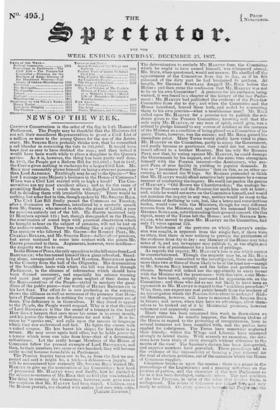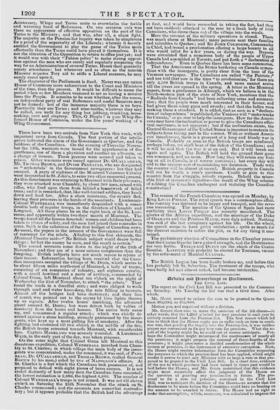NEWS OF THE WEEK.
COURTLY Conservatism is the order of the day in bath Houses of Parliament. The People may be thankful that the Ministers did not ask their munificent Representatives to grant a Civil List of a million or more to the young Queen for the use of the Aristo- cracy. Mr. SPRING RICE probably thinks now, that he committed a sad blunder in restricting the vote to 395,0001. It would have been just as easy to have doubled the sum ; and then indeed it would have been worth while to place a daughter in the Queen's service. As it is, however, the thing has been pretty well done. In 1831, the People got a Reform Bill for 385,0007.; but in 1837, the Crown gives nothing in exchange for a larger Civil List. Mr. RICE may reasonably plume himself on being a cleverer personage than Lord ALTRORP. Exultingly may he say to the Queen—" See how I manage your Majesty's business in the House of Commons! When was a Civil List carried with so high a hand ? The Con- servatives are my most excellent allies ; and as for the score of grumbling Radicals, I crush them with dignified hauteur, if I fail in deluding them with irresistible blarney." There would be nothing but sober fact in this, though spoken by Mr. SPRING RICE. The Civil List Bill finally passed the Commons on Tuesday, after a discussion on Pensions, introduced by a masterly speech from Mr. GROTE; who moved to strike the grant of 1,2001. a year for pensions entirely out of the bill. Mr. GROTE mustered only 23 Members against 125 ; but, though disregarded in the House, the combination of sound logic with practical observation which he brought to bear on the subject of pensions, will not be lost on the audience outside. There was nothing like a reply attempted. The speakers who followed Mr. GROTE—Sir ROBERT PEEL, Mr. CHARLES BULLER, and Mr. SPRING RICE—talked about pensions, but never ventured to come into contact with the points Mr. GROTE presented to them. Arguments, however, were needless— the majority was five to one. In the House of Peers, the only opposition to the bill came fromLord Bitor GRAM; who has roused himself like a giant refreshed. Stand- ing alone, unsupported even by Lord RADNOR, BROUGHAM spoke to the Country from the hall of the Oligarchy. His denunciation of the breathless haste will which the bill was forced through Parliament, in the absence of information which should have been deemed necessary, and especially his solemn warning and most just reproof of the gross neglect of their duties by the Representatives of the People—styled in mockery the guar- dians of the public purse—were worthy of HENRY BROUGHAM in his best days. The effect he is now producing in the country, shows the silliness as well as meatiness of the pretence that Mem- bers of Parliament can do nothing for want of excitement out of doors. The deficiency is in themselves. If they dared to appeal to the People, the People would respond. Why is it that the voice of Lord Bunion:sat is like the sound of a trumpet in the land? How does it happen that once more his name is in every mouth, and his praise the theme of Reformers far and wide ? It is be- cause lie "speaks out," and calls upon the masses in language which they can understand and feel. He tights the enemy with a naked weapon. He has burnt his ships ; for him there is no retreat. He may never again hold office, but he holds power by a tenure which none can take from him—that of a determined self-reliance. Let the really honest Members of the House of Commons follow the present example of Lord BROUGHAM, and then, be their numbers two score or two hundred, they will become really useful because formidable in Parliament. The Pension inquiry turns out to be, as from the first we sus- pected and said it might be, a trick—n delusion—a juggle. It will be remembered bow earnestly Sir. SPRING RICE wished Mr. HARVEY to give up the nomination of his Committee ; how bard of persuasion Mr. HaEvey was ; and finally, how he yielded to the solemn assurances of Mr. RICE that no foul play was intended. The delay in naming the Committee, however, soon gave rise to the suspicion that Mr. II auvEy had been duped. Children, says the Roman proverb, are cheated with smiles and men with oaths. The determination to exclude Mr. HARVEY from the Committee which he ought to have named himself', was whispered abroad. Mr. RICE, when questioned, would not answer. lie shuffled off the appointment of the Committee from day to day, as if he felt ashamed of the dirty part he had bargained to perform. At length, Sir GEORGE SINCLAIR dragged Mr. RICE before the House ; and then came the confession that Mr. HARVEY was not to be on his own Committee! A pretence for his exclusion being wanted, it was found in a chapter of the history of the last Parlia- ment : Mr. HARVEY had published the evidence of the Poor-law Committee from day to day ; and when the Committee and the House interfered, braved them both, and ended by converting them to his own practice—what a troublesome man! Mr. RICE called upon Mr. HARVEY for a promise not to publish the evi- dence given to the Pension Committee; knowing well that the only reply Mr. HARVEY, or any man of spirit, could give, was a refusal to pledge himself to any course of conduct at the instance of the Minister as a condition of being placed on a Committee of in- quiry. There, however, was the excuse; and Mr. RICE gained his immediate point. Many Tories would gladly have voted to place Mr. HARVEY on the Committee, partly to annoy the Government, and partly because as gentlemen they could not but resent the insult offered to a brother Member. But the wily Sir ROBERT PEEL saw that, by voting against Mr. HARVEY, he could damage the Government by his support, and at the same time strengthen himself with the Pension interest—the Aristocracy, who sus- pect PEEL of over facility in yielding to popular demands. It was as "proximate Prime Minister" that, on this, as on other oc- casions, be assisted the Whigs. Sir ROBERT pretended to think that Mr. HARVEY would offend sensitive lady pensioners by a coarse manner of conducting the inquiry. He could not pardon the genius of HARVEY'S "Old Brown the Churchwarden;'' the analogy be- tween the Poor-rate and the Pension-list made him sick at heart ; and, while lie would not serve on the Committee himself,and would not sanction the inquiry in any way, neither would he stoop to the shabbiness of declining to vote, but, like a brave and conscientious leather, would vote with the Ministers, though for very different reasons from the Ministers, and against his esteemed friend Sir GEORGE SINCLAIR, notwithstanding their general concord. On this signal, many of the Tories left the House ; and Sir GEORGE SIN- CLAIR, who moved to place Mr. HARVEY on the Committee, had only 71 votes against 122. The hollowness of the pretence on which HARVEY'S exclu- sion was sought, is apparent from the single fact, if there were no other, that there is now nothing to prevent the publicatien of the evidence from day to day : any Member of the House may take notes of it, and any newspaper may publish it, at the slights:id common risk of punishment for a breach of privilege. As regards the inquiry, Mr. HisevEy's loss is one which cannot be counterbalanced. Though the majority may be, as Mr. Ries stated, nominally committed to the investigation, there are hardly more than two or three of them likely to be of the least use—except to Mr. SPRING RICE himself, and the ladies and gentlemen his clients. Several will indeed use the opportunity to curry favour with the Minister and the pensioners : with this view, some Mem- bers, we have beard, actually canvassed for appointments on the Committee ; and those who did so are not likely to have been so squeamish as Mr. HARVEY in regard to the "condition precedent." Who, then, can expect any real public benefit from the mockery of an investigation which the Pension-list is about to undergo? Radi- cal Members, however, will learn to mistrust Mr. SPRING RICE in future; and never, when they have an advantage, allow them- selves to be tricked out of it by Ministerial promises, however vehement and apparently sincere. Much time has been consumed this week in discussions on election petitions. As usually happens, the Standing Orders of the House in regard to the perfecting of recognizances, have in several instances not been complied with, and the parties have applied for indulgence. The Tories have somewhat neglected their friends ; whilst the Whigs and Liberals bare mustered strongly to defend theirs. With scarcely an exception, the divi- sions have been trials of party strength without reference to the merits of the case: The Speaker's dictum has been disregarded, and superior numbers have prevailed. These procedings add to the evidence of the impossibility of forming a just tribunal for the trial of election petitions, out of the materials which the House of Commons supplies.
Christmas breaks in upon the session : there is a pause in the proceedings of the Legislature: and a passing reflection on the position of parties, and the character L.f the new Parliament so far as it has been developed, naturally arises. The real coalition of the two Factions, in spite of the table that thvidos them, is undisguised. The points of diill:rence are Littiold few,- and luny easily be settled. On every ques:ion betwaalith0 Peophi aka the Aristocracy, Whigs and Tories unite to overwhelm the feeble and wavering band of Reformers. On one occasion only was there an appearance of effective opposition on the part of the Tories to the Ministry ; and that was, after all, a sham fight. The majority on the Pension-list inquiry was taken by simpletons for a proof of the superiority of the Liberals; whereas it merely enabled the Government to play the game of the Tories more effectually than the Tories could have played it themselves. It is not the intention of the Opposition to return to office just yet; and it would war with their "Fabian policy" to make strong opposi- tion against the men who are surely and regularly preparing the way for an Administration of avowed Tories. Hence their generally scanty attendance: but whenever and as often as the interim Minister requires Tory aid to stifle a Liberal measure, he may surely count upon it.
The character of the Parliament is fixed. Never was any rotten House of Commons more subservient to the Court and Ministers of the time, than the present. It would be difficult to name the period when so few Members ventured to act as having a mission from the People. It remains to be seen whether, after the recess, an independent party of real Reformers and useful Senators may not be formed ; but of the immense majority there is no hope. Practically they are Tories ; and nine-tenths, whatever they may be called, are unfit for any thing but jobbing, truckling, noise- making. cant and claptrap. This, 0 People ! is your Whig-Re- formed House of Commons, under the five years' working of a Whig Government.



























